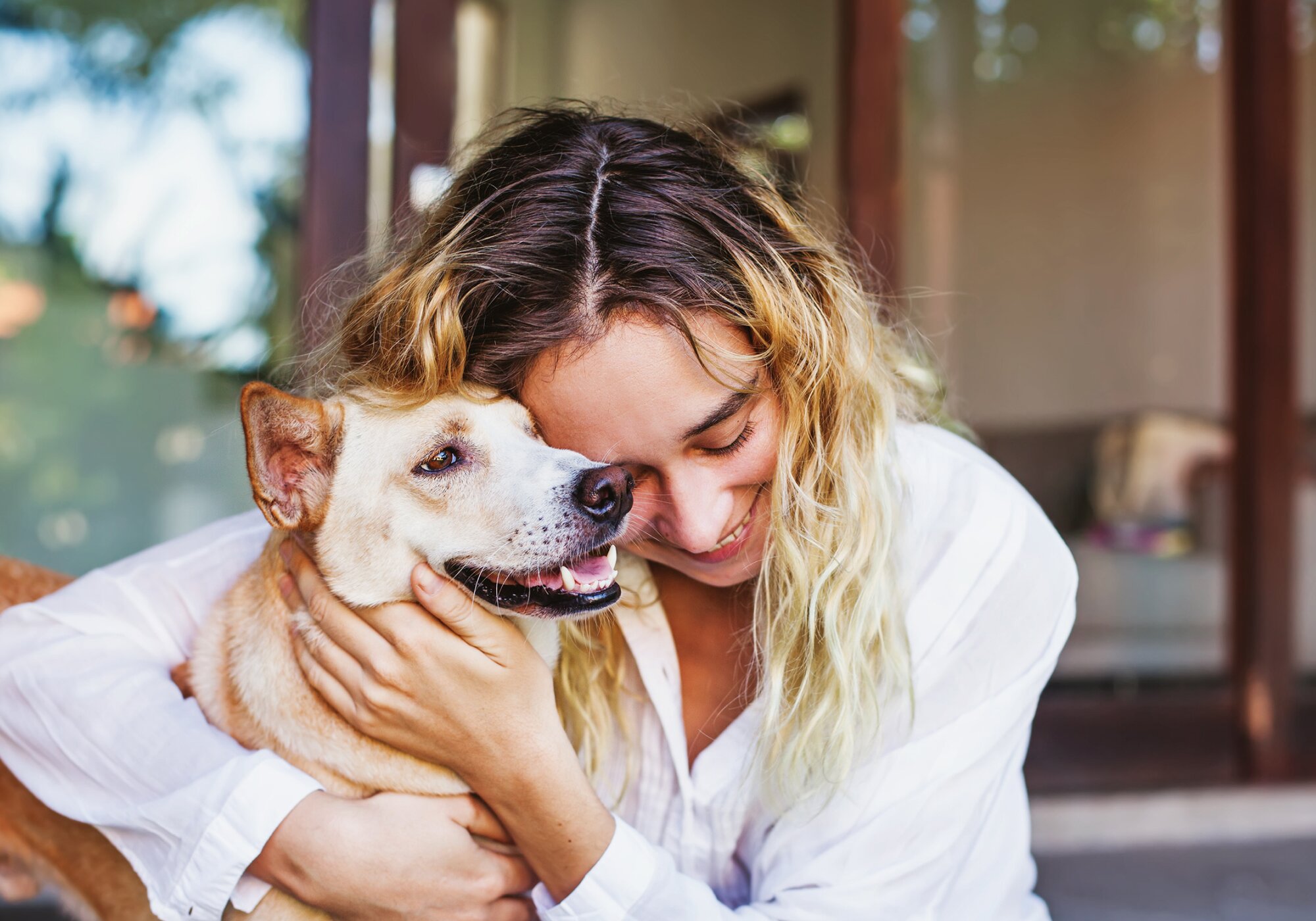The second you notice your dog scratching it can be a scary feeling. At first glance, you might think you're dealing with dog fleas or lice.
Parasites are common and people often associate scratching with fleas or lice. But, other types of allergies are most likely the culprit.
Keep reading to learn:
- What are allergies
- Types of allergies in dogs
- 8 common dog allergy symptoms
- Treating your dog's allergies
What are allergies

An allergy is the immune system's response to a substance called an allergen. Allergens are everywhere and include:
- Plants
- Pollen
- Dust mites
- Mold
- Pet dander
- Other animals
- Food
Your dog's immune system may respond to an allergen by releasing histamines. Histamines cause an inflammatory response and swelling. But, some dogs produce too many histamines, which can trigger a severe reaction in their bodies.
This is why allergens can cause a variety of problems from itchy skin to anaphylactic shock. Allergens are also a common cause of:
- Skin conditions
- Ear infections
- Bacterial infections
- Other health problems
Dogs of all breeds and sizes are susceptible to allergies. Some breeds that develop allergies include:
TerriersHerding & workingSportingNon-sportingToyAmerican Pit Bull TerrierBoxerCocker SpanielBichon FriséBrussels GriffonScottish TerrierDobermanBoston TerrierBoxerMalteseWest Highland White TerrierGerman Shepherd DogLabrador RetrieverDalmatianShih TzuWirehaired Fox TerrierLhasa ApsoShar-pei
Types of allergies in dogs

Like humans, dogs can suffer from different types of allergies. They can be seasonal, food-related, or environmental.
Seasonal allergies
The most common allergies in dogs stem from environmental allergens. These are typically seasonal allergies that flare up with an increase in:
- Oak or pine trees
- Grass or weeds
- Ragweed
- Mold spores
- Dust mites
Environmental allergies trigger an immune response in your dog. This tells your pup's immune system to overproduce antibodies causing inflammation. And, ultimately lead to upper respiratory infections and other conditions like atopic dermatitis.
Atopic dermatitis
Atopic dermatitis is a skin disease that occurs when your dog's immune system overreacts to an airborne allergen.
Food allergies
Another common allergic reaction in dogs can come from specific foods. Protein is the biggest food allergy culprit. The most common food allergies are:
- Beef
- Chicken
- Dairy
- Gluten
- Soy
Food allergies are common in people and dogs. In most cases, your dog's symptoms of food allergy will be mild to moderate.
Affected dogs with food allergies may experience:
- Skin irritation (perioral dermatitis)
- Stomach upset
- Diarrhea
- Vomiting
- Lethargy
- Depression
If you suspect your dog has a food allergy, schedule an appointment with your veterinarian. They can assess any clinical signs and symptoms.
Your veterinarian may want to perform skin testing or a food trial to determine the allergy and its severity. They can also provide a treatment plan to prevent future reactions.
Environmental threats
Fleas are a common pest that can cause serious harm to your furry friends. Without monthly flea and tick protection, fleas can lead to severe health issues. That's why it's so important to keep an eye out for signs of flea allergy.
Flea allergy dermatitis (FAD)
Flea allergy dermatitis occurs from an allergic reaction to direct contact with flea saliva. When a flea bites your dog, it leaves behind allergens that irritate your pet's skin.
Look out for these allergic dermatitis symptoms including:
- Irritated skin, itchiness, or skin rash
- Redness and swelling around the bite site
- Hair loss, scabbing, and crusting on the skin
- Secondary infections (if not treated)
8 symptoms of dog allergies

Not surprisingly the most common symptom of pet allergies is skin conditions. Allergic pets may experience an allergic reaction causing their skin to become itchy, red, and inflamed.
This creates a lot of discomfort for your pet. Most dogs will begin rubbing, scratching, and licking excessively — which can lead to a variety of clinical signs.
Here are the most common symptoms of allergies in dogs:
1. Itchy skin
Allergic reactions are often accompanied by an itchy rash on your dog's skin. This is usually more noticeable on their face and paws. But, be mindful of their mouth, neck, and ears for signs of redness or irritation.
2. Hair loss and scabbing
Skin allergies may lead to scratching or face rubbing in an attempt to relieve discomfort. Frequent scratching in one area can create bald spots, fur loss, open wounds, scabbing, and infection.
3. Facial swelling
A common symptom of an allergic reaction is inflammation. This can make your canine's face puffy and uncomfortable. Take note of frequent face rubbing on the ground or in their bed. Some other signs that go with face rubbing include sneezing and coughing.
4. Sneezing and runny nose
Like people, many dogs may sneeze because of an itchy or irritated nose. When your pup has an allergy attack, they will sneeze until they get relief. You may also notice a small amount of discharge from your dog's eyes and nasal passages.
5. Coughing
Dogs also cough to relieve their allergy symptoms. But, this can make it difficult for your dog to breathe which can create anxiety and stress in your pet. Stay by their side and continue to track other signs as they arise.
6. Stomach upset and lethargy
Diarrhea and vomiting are common health issues in dogs, so it can be hard to determine if they are allergy-related. If your dog continues to vomit for more than 48 hours, it's likely a sign of something more serious. Be mindful of lethargy, weakness, lack of appetite, and depression.
7. Chronic ear infections
If your pup has chronic ear infections, it could be due to an allergy. Your veterinarian can examine your dog's ears at a regular check-up and provide a treatment plan.
8. Anaphylaxis (acute allergic reaction)
In acute allergic reactions, your dog may go into anaphylactic shock. Other severe signs include:
- Anemia in the gums and tongue
- Cold limbs
- Difficulty breathing
- Excessive salivating or drooling
- Increased heart rate
- Seizures
If your dog experiences these symptoms, consult with your veterinarian immediately.
Treating your dog's allergies

If your pup has allergies, there are several things you can do to treat them. Follow these steps to create a treatment plan to support your pet's allergic reactions.
1. Start with allergy testing.
To begin taking care of your pet's allergies you'll want to identify the type of allergy. Allergy testing is often as simple as a blood test or a sample of skin cells. Test results will give answers about what might be causing skin allergies and help treat symptoms.
2. Skip the woods during peak allergy season.
Avoid letting your pooch roam around in grassy fields and parks during peak allergy and flea season. Environmental allergens are strongest from March through June in North America. Keeping your pup inside will help prevent exposure to allergens. After spending time outdoors, be sure to clean their face and paws with a clean washcloth.
3. Try hypoallergenic toys and bedding.
While getting rid of dog allergies isn't entirely feasible, it is possible to manage asthma and treat other issues. Hypoallergenic bedding can help reduce symptoms by providing an anti-allergen barrier.
4. Switch up your dog's diet.
Depending on the type of allergy, you may be able to improve your pet's health with a diet change. Food allergies are often easily treated by removing or replacing certain food groups. Work with a nutritionist and pay close attention to food labels.
5. Treat your pup with the right medications.
If your pet's allergies are severe they may need a more serious treatment. This could include monthly allergy shots, immunotherapy, and nasal sprays. You'll need to schedule a dog check-up with a specialist who treats dogs with allergies to determine a treatment plan.
It's also important to maintain strict flea control year-round. Whether you use oral medications or a topical treatment your best course of action is to prevent exposure to pests and other causes. Consult your veterinarian to understand what types of flea treatment and medications work best to protect your dog.


